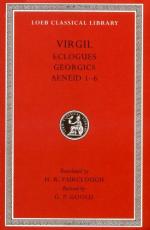|
This section contains 5,700 words (approx. 19 pages at 300 words per page) |

|
SOURCE: An introduction to Virgil's Pastoral Art: Studies in the“Eclogues,” Princeton University Press, 1970, pp. 3-19.
In the essay below, Putnam discusses some of the major critical issues surrounding Vergil's Eclogues, arguing that one of the most appealing and pertinent aspects of the collection is Vergil's effort to identify the role of the individual within a restrictive society.
The notion of Virgil as gentle poet of simple charm has been slow to die.1 We accept melancholy as the poet's dominant characteristic, yet we assume its incorporation in a stance which is poised, reserved, aloof—“classical,” in a word. Though evil continues to scheme and life remains charged with passions, though man be forced into a not always kindly dialogue with nature, his fellow creatures, and himself, Virgil somehow manages (we are assured) to bathe all suffering in a magic glow which reconciles opposites and leaves a sense of...
|
This section contains 5,700 words (approx. 19 pages at 300 words per page) |

|


